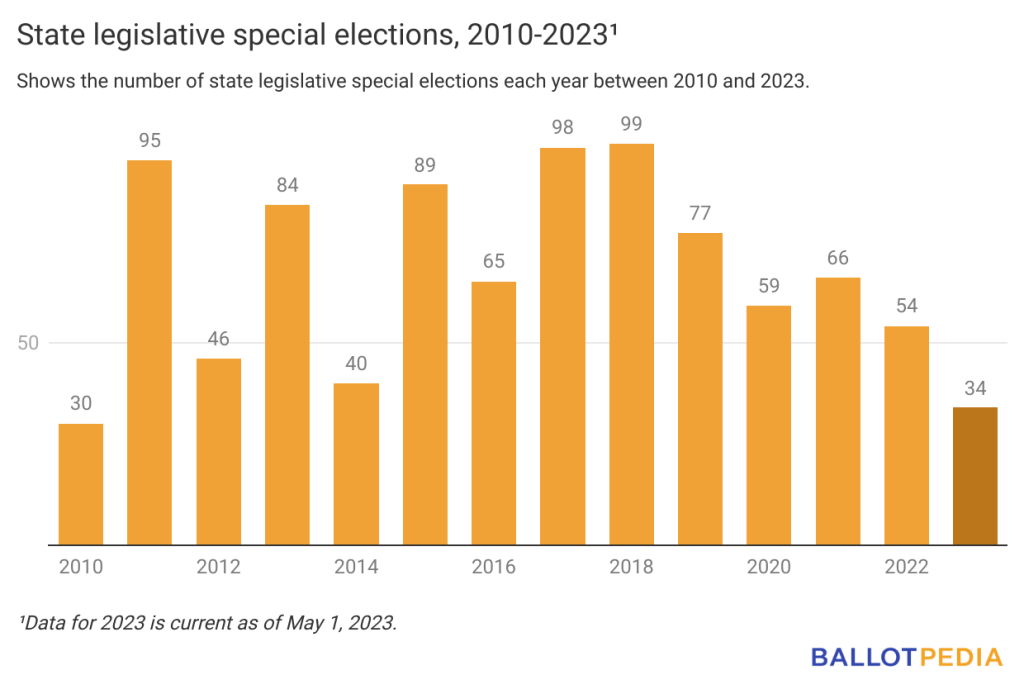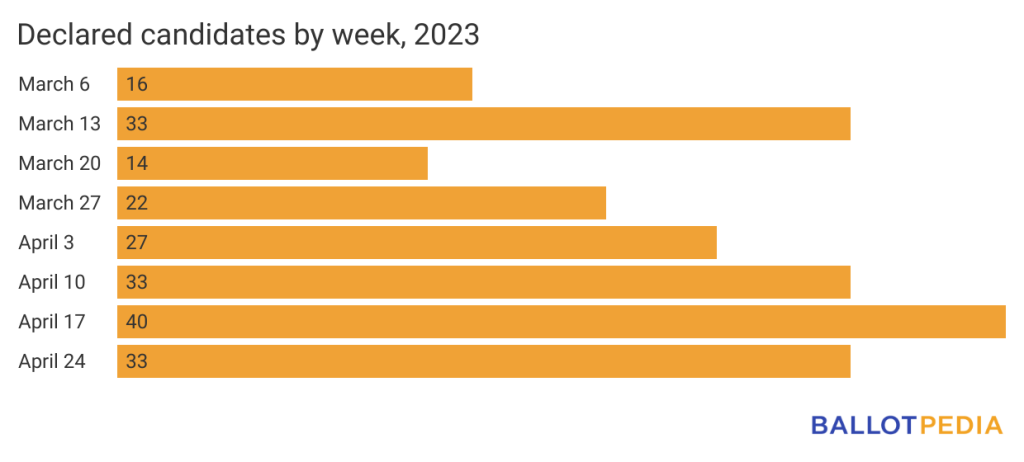Welcome to the Tuesday, May 2, Brew.
Here’s what’s in store for you as you start your day:
- A preview of Kentucky’s May 16 statewide primaries
- Election Day roundup: Massachusetts, Nebraska, Indiana and more
- 33 candidates filed for federal and statewide offices last week
A preview of Kentucky’s May 16 statewide primaries
Kentucky’s gubernatorial election headlines its statewide races this year, and both major parties will choose their nominees in the upcoming primaries on May 16.
The May 16 primary is largely for state executive offices. Kentucky is one of only three states—along with Louisiana and Mississippi—holding state executive elections this year. Unlike in New Jersey and Virginia, Kentucky is not holding state legislative elections (there is, however, a special election on May 16 to fill a vacancy in the state Senate, and we’ll take a look at what’s at stake there later in this story).
In Kentucky, the candidate who wins a plurality of the vote in the primary advances to the general election. Kentucky is one of 39 states in which primary candidates advance by winning a plurality of the vote. Primaries with only one candidate are canceled. In those cases, candidates advance automatically to the general election.
Let’s take a look at what’s on the ballot on May 16.
Governor
Kentucky is one of 11 states with divided government. Governor Andy Beshear, a Democrat, was first elected in 2019. Republicans hold majorities in both chambers of the legislature.
Beshear faces Peppy Martin and Geoff Young in the Democratic primary. Beshear was Kentucky’s Attorney General from 2016 to 2019. Martin was the Republican gubernatorial nominee in 1999. She lost to then-Gov. Paul Patton (D) 22.2% to 60.7%. Young ran unsuccessfully for governor as a Democrat in 2015, and was also a candidate in 2016 and 2018 for Kentucky’s 6th Congressional District. Martin lost in the primaries on both occasions.
Twelve candidates have entered the Republican primary. Media analysis has generally focused on three candidates—Daniel Cameron, Ryan Quarles, and Kelly Craft.
Cameron is the current state Attorney General. Previously, he served as legal counsel to U.S. Sen. Mitch McConnell (R). On June 16, 2022, former President Donald Trump (R) endorsed Cameron.
Quarles is the state Commissioner of Agriculture and a former Kentucky House member. Four state senators and 22 state representatives have endorsed Quarles.
Craft served as the U.S. Ambassador to the United Nations under Trump from 2019 to 2021. U.S. Rep. James Comer (R-Ky.) endorsed Craft.
The Cook Political Report, rates the general election Lean D: “After eking out a win in 2019 over unpopular Republican Gov. Matt Bevin, Gov. Andy Beshear starts out with the edge to win a second term. Given the state’s heavy red lean, Republicans still have an opportunity, but they must first get through their own crowded primary.”
Matt Blevin was the last Republican governor of Kentucky. He served from 2015 to 2019.
The lieutenant governor is also up for election. As of 2020, gubernatorial and lieutenant governor candidates run as a ticket. Gubernatorial candidates have until Aug. 8 to designate a running mate.
Kentucky is one of six states in which a simple majority in both chambers of the legislature can override a gubernatorial veto. In 36 states, a two-thirds vote is required from both chambers.
Other state executive elections
Here are the other state executive elections up for election this year in Kentucky. Click a link to read more about the elections.
- Attorney General
- Secretary of State
- Treasurer
- Auditor of Public Accounts
- Commissioner of Agriculture
Special state legislative election
Kentucky is holding a special election on May 16 to fill a vacancy in state Senate District 8. Republican Ralph Alvarado, the previous officeholder, resigned on Jan. 6 to become commissioner of the Tennessee Health Department. Robert Sainte (D), Greg Elkins (R), and Richard Henderson (Independent) are running in the election.
Although this is an odd-numbered year, there are a few states holding statewide elections. Recent Brew editions have previewed upcoming elections in New Jersey and Virginia.
In the 2020 presidential election, Donald Trump (R) won Kentucky 62% to President Joe Biden’s 36%.
Click below to read more about Kentucky’s upcoming elections.
Election Day roundup: Massachusetts, Nebraska, Indiana and more
It’s Tuesday, and that means it’s Election Day for some voters. Let’s look at a few of the elections we’re covering today.
State legislative elections
In Massachusetts, voters will decide primaries for two vacancies in the state House of Representatives. General elections are scheduled for May 30.
- Ninth Suffolk District: The district became vacant after Jon Santiago (D) resigned to accept a job in Gov. Maura Healey’s (D) administration. The district covers part of Boston. John Moran and Amparo Ortiz are running in the Democratic primary. Moran completed Ballotpedia’s Candidate Connection survey. No Republican primary was scheduled.
- Tenth Suffolk District: The seat became vacant after Edward Coppinger (D) resigned on Feb. 28 to accept a job with MassBio. Approximately 41,210 residents live in the district. The district includes part of Boston and Brookline. Bill MacGregor, Robert Orthman, and Celia Segel are running in the primary. No Republican primary was scheduled.

As of this writing, 34 state legislative special elections have been scheduled for 2023. There were an average of 69 state legislative special elections between 2010 and 2022. So far this year, one district has changed party control. In the Jan. 10 special election for Virginia Senate District 7, Aaron Rouse (D) defeated Kevin Adams (R). The former incumbent, Jennifer Kiggans (R), resigned on Nov. 15, 2022 after being elected to represent the 2nd Congressional District. In 2021, six seats changed party control in special elections—three from Republican to Democrat and three from Democrat to Republican.
Mayoral elections
We’re covering 40 mayoral elections in 2023. Voters in Lincoln, Neb., Fort Wayne, Ind., and Indianapolis, Ind., will vote in mayoral elections on May 2.
The elections in Indiana are primaries. General elections are scheduled for Nov. 7. Both Fort Wayne and Indianapolis have Democratic mayors.
We covered Lincoln’s general mayoral election in detail in the April 26 edition of the Brew. Incumbent Leirion Gaylor Baird and Suzanne Geist are running in the nonpartisan election. They were the top-two vote-getters in the April 4 primary. Baird is a Democrat. Geist was a Republican state legislator until her resignation in 2023.
School board elections
Three seats on the Lincoln Public Schools school board in Nebraska are up for nonpartisan election on May 2. Primaries were held April 4.
- In District 2, Emily Pollen is running against Piyush Srivastav. Read Pollen’s responses to our Candidate Connection survey here.
- In District 4, incumbent Annie Mumgaard is running against Alaina Brouillette. Read Brouillette’s responses to our Candidate Connection survey here.
- In District 6, incumbent Bob Rauner is running against Richard Aldag IV. Rauner and Aldag completed Ballotpedia’s Candidate Connection survey. We previewed their survey responses in the March 29 edition of Hall Pass, our weekly newsletter on education and school boards.
Click below to stay up to date on all our election coverage.
33 candidates filed for federal and statewide offices last week
Last week, 33 candidates filed to run for congressional and state offices—including for elections in 2023, 2024, 2025, and 2026. Two weeks ago, we tracked 40 candidates who declared for congressional and state offices.

This year, we’ve tracked 575 declared candidates for federal and statewide offices.
Here’s a breakdown of the candidates who declared last week:
Of the partisan nature of the declared candidates….
- 18 are Democrats.
- 14 are Republicans.
- One is a minor-party candidate.
Of the offices tracked…
- 27 filed for Congress
- Three filed for state legislatures
- Two filed for governorships
- One filed for a lower state executive office.
Between March 27 and April 17, we tracked an average of 30.5 candidates who filed for federal or state elections.
We cover elections for tens of thousands of offices across the country, and part of that work includes keeping tabs on the candidates who file to run for those offices. We’ll periodically bring you updates on how many candidates are signing up to run for state and federal offices. We process both official and declared candidates.
Click here to read more about our definition of candidacy. Click the link below to see a list of all declared candidates for federal elections in 2024.
Learn More






